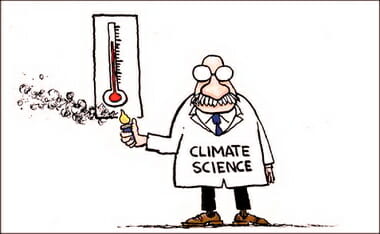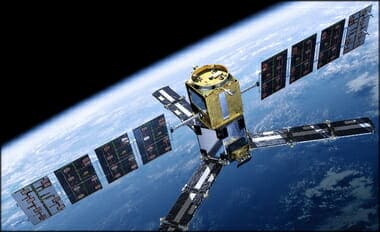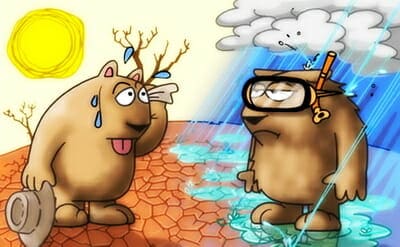Climate alarmists insist there’s a “scientific consensus” that says climate change is a crisis, and man causes it! Researcher Judith Curry tells me, “it’s a manufactured consensus.” Curry was a department chair at Georgia Tech when she spread alarm about climate change. The media loved her then. She claimed there was an increase in hurricane intensity. But then some researchers pointed out gaps in her research: years with low levels of hurricanes. “Like a good scientist, I went in and investigated.” When she acknowledged a lack of evidence that hurricane intensity had increased, she was ruthlessly attacked by climate alarmists. Her career suffered. Now Curry reveals nefarious ways “the science” about climate change has been corrupted.
Judith Curry


Satellite Drift and Global Warming

[For the bottom line people]
“We’ve looked at their new results versus our data, and it does appear that the new warming they’ve ‘found’ is just spurious warming in the old (poorly-calibrated, and orbit time-drifting) NOAA-14 MSU instrument, which they leave in the data analysis,” Roy Spencer, a climatologist at the University of Alabama in Huntsville, told TheDCNF.
“We remove that spurious warming since it disagrees with the newer (better calibrated, non-drifting) NOAA-15 AMSU instrument flying at the same time,” Spencer said.
[….]
The new RSS data runs much higher than UAH satellite data, run by Spencer and Dr. John Christy, which only shows a warming trend of 0.072 degrees Celsius per decade. RSS also runs hotter than weather balloon data, which show about the same or less warming than UAH data.
One of the issues that have recently come up in conversation is that the Satellite data has been wrong for essentially 19-years is showing a pause in global warming… even though mankind has produced almost two-thirds of the CO2 since the Industrial revolution in that same time. U.S. News and World Report puts it thus:
Climate change doubters may have lost one of their key talking points: a particular satellite temperature dataset that had seemed to show no warming for the past 18 years.
The Remote Sensing System temperature data, promoted by many who reject mainstream climate science and especially most recently by Sen. Ted Cruz, now shows a slight warming of about 0.18 degrees Fahrenheit since 1998. Ground temperature measurements, which many scientists call more accurate, all show warming in the past 18 years.
“There are people that like to claim there was no warming; they really can’t claim that anymore,” said Carl Mears, the scientist who runs the Remote Sensing System temperature data tracking.
The change resulted from an adjustment Mears made to fix a nagging discrepancy in the data from 15 satellites.
The satellites are in a polar orbit, so they are supposed to go over the same place at about the same time as they circle from north to south pole. Some of the satellites drift a bit, which changes their afternoon and evening measurements ever so slightly. Some satellites had drift that made temperatures warmer, others cooler. Three satellites had thrusters and they stayed in the proper orbit so they provided guidance for adjustments.
Mears said he was “motivated by fixing these differences between the satellites. If the differences hadn’t been there, I wouldn’t have done the upgrade.”
NASA chief climate scientist Gavin Schmidt and Andrew Dessler, a climate scientist at Texas A&M, said experts and studies had shown these problems that Mears adjusted and they both said those adjustments make sense and are well supported in a study in the American Meteorological Society’s Journal of Climate….
This “orbital drift” is based on a paper by Carl A. Mears and Frank J. Wentz, which was first submitted to Journal of Geophysical Research, and had the paper rejected. They then “revamped” the paper, and turned it into the Journal of Climate. Keep in mind that there are only two groups working on this stuff… it is a highly specialized field, and Dr. Roy Spencer and Dr. John Christy were and are key to understanding this data set and any changes to it (see appendix). Anthony Watts asked about the paper and their review of it:
UPDATE1: Given this sort of work has only two groups doing it, it is a very narrow field of scientific specialty, I asked Dr. Spencer this question:
He replied:
Interesting question…. John reviewed their original paper submission to Journal of Geophysical Research, in detail, asking for additional evidence — but not advocating rejection of the paper. The JGR editor ended up rejecting it anyway. Mears & Wentz then revised the paper, submitted it to Journal of Climate instead, and likely asked that we be excluded as reviewers.
As it turns out ~ there is something afoot. Three excellent posts…
- The ‘Karlization’ of global temperature continues – this time RSS makes a massive upwards adjustment
- Comments on New RSS v4 Pause-Busting Global Temperature Dataset
- Comment on New Satellite-Observed Temperature Dataset
JUDITH CURRY notes that the revised paper was not peer reviewed by these two juggernauts in the satellite “maintenance” — also noting that really we (myself included) are prematurely discussing this issue:
The climate models project strong warming in the tropical mid troposphere, which have not been borne out by the observations. The new RSS data set reduces the discrepancies with the climate model simulations.
Roy Spencer’s comments substantially reduce the credibility of the new data set. Their dismissal of the calibration problems with the NOAA-14 MSU is just astonishing. Presumably Christy’s review of the original submission to JGR included this critique, so they are unlikely to be unaware of this issue. The AMS journals have one the best review processes out there; I am not sure why Christy/Spencer weren’t asked to review. I have in the past successfully argued at AMS not to have as reviewers individuals that have made negative public statements about me (not sure if this is the case with Mears/Wentz vs Spencer/Christy).
There is a legitimate debate on how to correct for the diurnal cycle, but based on my assessment, the UAH empirically based approach seems better.
With regards to the ‘pause.’ The ‘pause’ in warming has generally been assessed using the lower tropospheric temperatures, which aren’t yet available from the new dataset. So it is not yet clear what impact the new data set will have on our interpretation of the pause.
With regards to the Feb 2016 spike, I think Bob Tisdale gets it mostly right. While a spike from the El Nino is expected, the Feb 2016 seems anomalous and largely associated with a warm spike in the Arctic (of ‘weather’ origin). I would expect a few more months of anomalously warm temperatures before the El Nino fades. I’m not sure what to make of the ‘re-emergent blob’ scenario.
We won’t know what the 2016 El Nino spike looks like until the end of the year. Then we can compare the 1997/1998 temperatures with 2015/2016 temperatures in a (cherry-less) apples to apples comparison, to assess the underlying trend in temperatures from 1998-2016. The trend will undoubtedly be positive, but most likely it will remain substantially less than the trend predicted by the climate models.
And what of the years following 2016? Will we see cooling and then a continuation of flat temperatures? Or continued warming? I suspect that there will be some cooling and continued flatness. I’ve stated before that it will be another 5 years before we have the appropriate prospective on the current temperature fluctuations and whether or not the early 21st century pause is over.
We just have to grab some popcorn and watch…better stock up, this is gonna take a while.
But still worth noting, EVEN IF you include the new data… we see modeling waaay overblown:
Without the new — I would say, messaged data from one satellite — we see a great comparison lining up of many tracks of reliable temps:
The models are 100% wrong. 100%
APPENDIX
…For their achievement, the Spencer-Christy team was awarded NASA’s Medal for Exceptional Scientific Achievement in 1991 and a Special Award by the American Meteorological Society in 1996 “for developing a global, precise record of earth’s temperature from operational polar-orbiting satellites, fundamentally advancing our ability to monitor climate.” In January 2002 Christy was inducted as a Fellow of the American Meteorological Society.
The data is published monthly, available for all to review. The satellite measurements have been a lightning rod for those who advocate that human emissions of greenhouse gases, particularly carbon dioxide (CO2), are causing significant global warming. There have been three relatively minor errors in the calculations that, when determined, were promptly corrected. Which is how science should work. The corrections involved orbital decay, orbital drift, and the cooling of the stratosphere. The measurement of temperatures, from the surface to roughly 50,000 feet (15 km) altitude, includes the layer for the “Hot Spot” and avoids the cooling stratosphere.
Calculations are now made by three separate groups, UAH, Remote Sensing Systems (RSS), and a group with the University of Washington. In addition, Christy uses four separate sets of radiosonde data from weather balloons to verify his work. The correspondence among these datasets is very close.
Also, Christy served as a contributor or lead author (2001) to the first four reports by the UN Intergovernmental Panel on Climate Change.
As state climatologist, Christy stated that, according to global climate models, the Paris Agreement to cut CO2 emissions will have an impact on temperatures so small that it cannot be measured. Further, he stated that based on research, if surface temperatures are used to estimate the greenhouse effect, daytime highs better serve the purpose than nighttime temperatures or averages. Daytimes highs are less influenced by changes in land use such as urbanization
[….]
John Christy exemplifies the perseverance, dedication to empirical science, and humanity befitting the Frederick Seitz Memorial Award.

Mark Steyn Goes Online In Front of Congress (+Judith Curry)
This comes by way of WUWT:
- This is a must watch, share it widely. Mark Steyn demolishes the “science is settled” meme in the Senate hearing yesterday. His ability to argue effectively on the fly is very impressive.
Hearing: Data or Dogma? Promoting Open Inquiry in the Debate over the Magnitude of Human Impact on Earth’s Climate US Senate Committee on Commerce, Science, and Transportation. Dr. Curry ask to respond to “denier” charge from Sen. Markey, and cites IPCC in her testimony. Steyn spars with Sen. Markey while Markey acts like he’s an authoritarian on the issue.

Walter Cronkite on Ice-Age (1972 Video) ~ Billion Dollar Ind.
Via NEWSBUSTERS:
…On September 11, 1972, Cronkite cited scientists’ predictions that there was a “new ice age” coming. He called that prediction from British scientist Hubert Lamb “a bit of bad news.”
Cronkite continued. “That while the weather may be just a little colder in the immediate years to come, the full extent of the new ice age won’t be reached for 10,000 years. And if you can stand any more good news, even then it won’t be as bad as the last ice age 60,000 years ago. Then New York, Cincinnati, St. Louis, were under 5,000 feet of ice. Presumably no traffic moved and school was let out for the day. And that’s the way it is, Monday, September 11, 1972.”
Lamb, the scientist Cronkite cited, was no fringe scientist. He founded the Climatic Research Unit at the University of East Anglia in Great Britain. When he died, the CRU director called him “the greatest climatologist of his time,” according to the Global Warming Policy Foundation. He was also credited with establishing “climate change as a serious research subject.”
Unlike scientists often quoted by the media today, GWPF said that Lamb viewed the Earth’s climate as changing constantly and naturally. Unlike its founder, CRU now has a major role in spreading global warming alarmism. CBS said in 2009, CRU “wields outsize influence” in warming circles. The Climategate scandal centered around leaked documents and emails from that organization….
Scaring the public in order to get funding is a multi-billion dollar industry, as is the push by leftists to “conquer” once and for all (since the days of Marx) “capitalism.” M.I.T.’s Richard Lindzen notes:
- Billions of dollars have been poured into studies supporting climate alarm, and trillions of dollars have been involved in overthrowing the energy economy. So it is unsurprising that great efforts have been made to ramp up hysteria, even as the case for climate alarm is disintegrating.
One should FOLLOW THE MONEY!
The following resignation letter was sent by Hal Lewis, professor emeritus of physics at the University of California, Santa Barbara, to the American Physical Society:
Sent: Friday, 08 October 2010 17:19 Hal Lewis
From: Hal Lewis, University of California, Santa Barbara
To: Curtis G. Callan, Jr., Princeton University, President of the American Physical Society
6 October 2010
Dear Curt:
When I first joined the American Physical Society sixty-seven years ago it was much smaller, much gentler, and as yet uncorrupted by the money flood (a threat against which Dwight Eisenhower warned a half-century ago).
Indeed, the choice of physics as a profession was then a guarantor of a life of poverty and abstinence—it was World War II that changed all that. The prospect of worldly gain drove few physicists. As recently as thirty-five years ago, when I chaired the first APS study of a contentious social/scientific issue, The Reactor Safety Study, though there were zealots aplenty on the outside there was no hint of inordinate pressure on us as physicists. We were therefore able to produce what I believe was and is an honest appraisal of the situation at that time. We were further enabled by the presence of an oversight committee consisting of Pief Panofsky, Vicki Weisskopf, and Hans Bethe, all towering physicists beyond reproach. I was proud of what we did in a charged atmosphere. In the end the oversight committee, in its report to the APS President, noted the complete independence in which we did the job, and predicted that the report would be attacked from both sides. What greater tribute could there be?
How different it is now. The giants no longer walk the earth, and the money flood has become the raison d’être of much physics research, the vital sustenance of much more, and it provides the support for untold numbers of professional jobs. For reasons that will soon become clear my former pride at being an APS Fellow all these years has been turned into shame, and I am forced, with no pleasure at all, to offer you my resignation from the Society….
(HEARTLAND | WATTS UP WITH THAT | CLIMATE REALIST | NEWSMAX)
Selected highlights from the above video via CLIMATE DEPOT:
Lindzen on VP Joe Biden saying ‘Denying climate change is like denying gravity.’
Lindzen: ‘He’s absolutely right. Climate has been changing for 4.5 billion years and on all time scales.
This is the problem. These guys think saying climate changes, saying it gets warmer or colder by a few tenths of a degree should be taken as evidence that the end of the world is coming. And it completely ignores the fact that until this hysteria, climate scientists used to refer to the warm periods in our history as optima.
Lindzen on CO2: ‘So here we are demonizing a chemical — a molecule essential to life – CO2– we are declaring doom based on things we used to like and somehow we are supposed to overturn our whole economy in order to deal with this purported disaster.’
Lindzen on EPA Chief: ‘Obviously I don’t think [the science] matters to [EPA Chief] McCarthy. She has a political aim. She has her marching orders and they are the orders regardless of what the underlying science is.’
Lindzen on what impact EPA regs will have on climate: ‘No matter what you believe about climate, none of them will have any impact on climate. They do make energy more expensive less available, less useful, they do hurt the poor, and they raise prices. It’s hard to see what the upside is excerpt for the people who get the subsidies. The whole thing is fairly absurd. There is so much money changing hands.’
ADDITION
BREITBART notes another interesting “evolving” positions towards evidence:
The American Physical Society (APS) has signalled a dramatic turnabout in its position on “climate change” by appointing three notorious climate skeptics to its panel on public affairs (POPA).
They are:
Professor Richard Lindzen, formerly Alfred P Sloan Professor of Meteorology at Massachussetts Institute of Technology (MIT), a highly regarded physicist who once described climate change alarmism on The Larry King Show as “mainly just like little kids locking themselves in darkclosets to see how much they can scare each other and themselves.”
John Christy, Professor of Atmospheric Science at the University of Alabama in Huntsville, who has written: “I’m sure the majority (but not all) of my IPCC colleagues cringe when Isay this, but I see neither the developing catastrophe nor the smokinggun proving that human activity is to blame for most of the warming wesee.”
Judith Curry, Chair of the School of Earth and Atmospheric Sciences at Georgia Tech, a former Warmist (and still a self-described “luke warmer”) who has infuriated many of her more extremist colleagues by defending skeptics and by testifying to the US House Subcommittee on the Environment that the uncertainties in forecasting climate science are much greater than the alarmists will admit.
As Anthony Watts has noted, this is news guaranteed to make a Warmist’s head explode.
The reason it’s so significant is that it comes only three years after one of the APS’s most distinguished members – Professor Hal Lewis – resigned in disgust at its endorsement of what he called “the global warming scam.”…..

Going Against the Consensus ~ New Wave of IPCC Heretics
All the links associated with this recent story are dead (too much traffic… I was dealing with this here at RPT a few weeks ago — so I sympathizese), so I am working with this larger excerpt found at What’s Up With That (h/t to Climate Depot):
Doing science by consensus is not science at all, says the climatologist all the alarmists love to hate. Not that the enmity bothers Judith Curry too much — and certainly not as much as the debasement of impartial inquiry by which the warmist establishment keeps all those lovely grants coming.
When climatologist Judith Curry visited Melbourne last week she took the time to chat with Quadrant Online contributor Tony Thomas. The professor and chair of the School of Earth and Atmospheric Sciences at the Georgia Institute of Technology is something of a stormy petrel in the climate-change community, as she has broken ranks with alarmist colleagues to question the articles and ethics of the warmist faith. This has made her less than popular in certain circles, even inspiring Scientific American, house journal of the catastropharians, to brand her “a heretic” who has “turned on her colleagues.” [excerpt below]
Excerpts:
THOMAS: What empirical evidence is there, as distinct from modelling, that ‘missing heat’ has gone into the deep oceans?
CURRY: Basically, none. Observations below 2 km in the ocean are exceedingly rare, and it is only since 2005 that we have substantial coverage below 700 metres.
THOMAS: Are you supportive of the line that the ‘quiet sun’ presages an era of global cooling in the next few decades?
CURRY: One of the unfortunate consequences of the focus on anthropogenic forcing of climate is that solar effects on climate have been largely neglected. I think that solar effects, combined with the large scale ocean-circulation regimes, presage continued stagnation in global temperatures for the next two decades.
THOMAS: If the skeptic/orthodox spectrum is a range from 1 (intense skeptic) to 10 (intensely IPCC orthodox), where on the scale would you put yourself
(a) as at 2009
(b) as at 2014,
and why has there been a shift (if any)?
CURRY: In early 2009, I would have rated myself as 7; at this point I would rate myself as a 3. Climategate and the weak response of the IPCC and other scientists triggered a massive re-examination of my support of the IPCC, and made me look at the science much more sceptically.
The story mentioned above from Scientific American likewise is found elsewhere in full, at the journal Nature:
In trying to understand the Judith Curry phenomenon, it is tempting to default to one of two comfortable and familiar story lines.
For most of her career, Curry, who heads the School of Earth and Atmospheric Sciences at the Georgia Institute of Technology, has been known for her work on hurricanes, Arctic ice dynamics and other climate-related topics. But over the past year or so she has become better known for something that annoys, even infuriates, many of her scientific colleagues. Curry has been engaging actively with the climate change skeptic community, largely by participating on outsider blogs such as Climate Audit, the Air Vent and the Black¬board. Along the way, she has come to question how climatologists react to those who question the science, no matter how well established it is. Although many of the skeptics recycle critiques that have long since been disproved, others, she believes, bring up valid points—and by lumping the good with the bad, climate researchers not only miss out on a chance to improve their science, they come across to the public as haughty. “Yes, there’s a lot of crankology out there,” Curry says. “But not all of it is. If only 1 percent of it or 10 percent of what the skeptics say is right, that is time well spent because we have just been too encumbered by groupthink.”
She reserves her harshest criticism for the Intergovernmental Panel on Climate Change (IPCC). For most climate scientists the major reports issued by the United Nations–sponsored body every five years or so constitute the consensus on climate science. Few scientists would claim the IPCC is perfect, but Curry thinks it needs thoroughgoing reform. She accuses it of “corruption.” “I’m not going to just spout off and endorse the IPCC,” she says, “because I think I don’t have confidence in the process.”
Whispered discreetly at conferences or in meeting rooms, these claims might be accepted as part of the frequently contentious process of a still evolving area of science. Stated publicly on some of the same Web sites that broke the so-called Climategate e-mails last fall, they are considered by many to be a betrayal, earning Curry epithets from her colleagues ranging from “naive” to “bizarre” to “nasty” to worse.
All of which sets up the two competing story lines, which are, on the surface at least, equally plausible. The first paints Curry as a peacemaker—someone who might be able to restore some civility to the debate and edge the public toward meaningful action. By frankly acknowledging mistakes and encouraging her colleagues to treat skeptics with respect, she hopes to bring about a meeting of the minds.
Climate Depot has another story linked to that Marco Morano entitles: UN IPCC Lead Author Dr. Richard Tol admits no global warming for 17 years – Rips bias in IPCC – UN’s ‘inbuilt alarmism made me step down’ – ‘By the time the report was finished, however, it hadn’t warmed for 17 years’ — in it we find nuggets like:
….The report also illustrates just how outmoded the IPCC has become since it was founded in 1988. Its reports are written over a period of three years, and finished months before publication.
When preparations started on AR5, the world hadn’t warmed for 13 years. That is a bit odd, if you believe the models, but not odd enough to merit a lot of attention.
By the time the report was finished, however, it hadn’t warmed for 17 years. That is decidedly odd, but hard to accommodate in a near-final draft that has been through three rounds of review.
After the report was finalized, but before it was published, a number of papers appeared with hypotheses about the pause in warming. AR5 was out of date before it was released.
The IPCC model… is broken.
[….]
Authors who want to see their long hours of IPCC work recognized should thus present their impact as worse than the next one.
It was this inbuilt alarmism that made me step down from the team that drafted the Summary for Policy Makers of Working Group 2. And indeed, the report was greeted by the four horsemen of the apocalypse: famine, pestilence, war, death all made headlines.
Richard Tol, Leslie Woodcock, James Lovelock, and others all feel the sting of the machine they were a part of.





